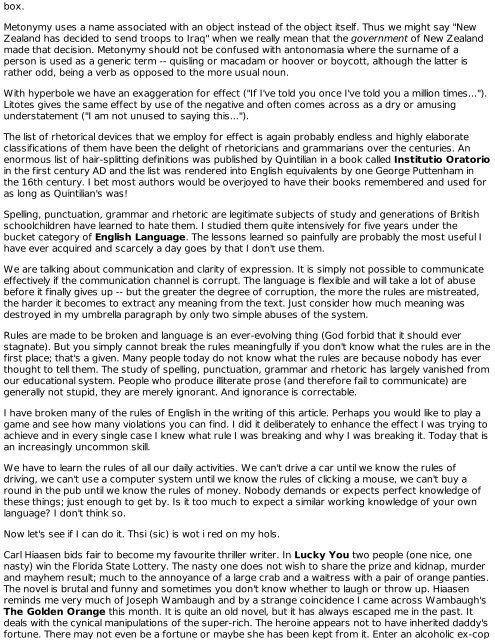Triffids Beard 2 - The Bearded Triffid
Triffids Beard 2 - The Bearded Triffid
Triffids Beard 2 - The Bearded Triffid
Create successful ePaper yourself
Turn your PDF publications into a flip-book with our unique Google optimized e-Paper software.
ox.<br />
Metonymy uses a name associated with an object instead of the object itself. Thus we might say "New<br />
Zealand has decided to send troops to Iraq" when we really mean that the government of New Zealand<br />
made that decision. Metonymy should not be confused with antonomasia where the surname of a<br />
person is used as a generic term -- quisling or macadam or hoover or boycott, although the latter is<br />
rather odd, being a verb as opposed to the more usual noun.<br />
With hyperbole we have an exaggeration for effect ("If I've told you once I've told you a million times...").<br />
Litotes gives the same effect by use of the negative and often comes across as a dry or amusing<br />
understatement ("I am not unused to saying this...").<br />
<strong>The</strong> list of rhetorical devices that we employ for effect is again probably endless and highly elaborate<br />
classifications of them have been the delight of rhetoricians and grammarians over the centuries. An<br />
enormous list of hair-splitting definitions was published by Quintilian in a book called Institutio Oratorio<br />
in the first century AD and the list was rendered into English equivalents by one George Puttenham in<br />
the 16th century. I bet most authors would be overjoyed to have their books remembered and used for<br />
as long as Quintilian's was!<br />
Spelling, punctuation, grammar and rhetoric are legitimate subjects of study and generations of British<br />
schoolchildren have learned to hate them. I studied them quite intensively for five years under the<br />
bucket category of English Language. <strong>The</strong> lessons learned so painfully are probably the most useful I<br />
have ever acquired and scarcely a day goes by that I don't use them.<br />
We are talking about communication and clarity of expression. It is simply not possible to communicate<br />
effectively if the communication channel is corrupt. <strong>The</strong> language is flexible and will take a lot of abuse<br />
before it finally gives up -- but the greater the degree of corruption, the more the rules are mistreated,<br />
the harder it becomes to extract any meaning from the text. Just consider how much meaning was<br />
destroyed in my umbrella paragraph by only two simple abuses of the system.<br />
Rules are made to be broken and language is an ever-evolving thing (God forbid that it should ever<br />
stagnate). But you simply cannot break the rules meaningfully if you don't know what the rules are in the<br />
first place; that's a given. Many people today do not know what the rules are because nobody has ever<br />
thought to tell them. <strong>The</strong> study of spelling, punctuation, grammar and rhetoric has largely vanished from<br />
our educational system. People who produce illiterate prose (and therefore fail to communicate) are<br />
generally not stupid, they are merely ignorant. And ignorance is correctable.<br />
I have broken many of the rules of English in the writing of this article. Perhaps you would like to play a<br />
game and see how many violations you can find. I did it deliberately to enhance the effect I was trying to<br />
achieve and in every single case I knew what rule I was breaking and why I was breaking it. Today that is<br />
an increasingly uncommon skill.<br />
We have to learn the rules of all our daily activities. We can't drive a car until we know the rules of<br />
driving, we can't use a computer system until we know the rules of clicking a mouse, we can't buy a<br />
round in the pub until we know the rules of money. Nobody demands or expects perfect knowledge of<br />
these things; just enough to get by. Is it too much to expect a similar working knowledge of your own<br />
language? I don't think so.<br />
Now let's see if I can do it. Thsi (sic) is wot i red on my hols.<br />
Carl Hiaasen bids fair to become my favourite thriller writer. In Lucky You two people (one nice, one<br />
nasty) win the Florida State Lottery. <strong>The</strong> nasty one does not wish to share the prize and kidnap, murder<br />
and mayhem result; much to the annoyance of a large crab and a waitress with a pair of orange panties.<br />
<strong>The</strong> novel is brutal and funny and sometimes you don't know whether to laugh or throw up. Hiaasen<br />
reminds me very much of Joseph Wambaugh and by a strange coincidence I came across Wambaugh's<br />
<strong>The</strong> Golden Orange this month. It is quite an old novel, but it has always escaped me in the past. It<br />
deals with the cynical manipulations of the super-rich. <strong>The</strong> heroine appears not to have inherited daddy's<br />
fortune. <strong>The</strong>re may not even be a fortune or maybe she has been kept from it. Enter an alcoholic ex-cop


